|


text translation service for many worldwide languages
Many people who live in the countryside already know how to harvest nature’s bounty, wild food, wild herbs and medicinal plants that are available to anyone who takes the time and trouble to learn about wild foods that abound in their localities. Much of this knowledge has been passed down through countless generations, and many of the wild foods that made up the staple diets of peoples over the the past 250,000 years or more are still available today …
Techniques for finding, purifying, and storing water are also as ancient as the hills, and constitute the major part of what is termed the ‘bushcraft’ of many peoples. While modern camping, climbing and general back-country hiking equipment is manufactured using the same skills and knowledge of extreme environments that has similarly been passed down through the ages as the ‘traditional skills’ of many peoples …
Below are a small selection of books, videos and DVDs about basic ‘survival skills’ that have not changed much in the past 250,000 years or more, and these skills are practical, down-to-earth, tried-and-tested techniques that are still in everyday use by peoples who live closer to the land in many non-industrialised countries. They are also skills that are as relevant in North America and Northwestern Europe, as they are in the deserts, jungles and mountainous regions of every continent …
In subsequent pages there are more books, videos and DVDs about small-scale organic food production, survival skills and wilderness living, along with articles about becoming as ‘self-sufficient’ as possible in an increasingly uncertain world. Useful skills for expeditions, exploring, camping trips, as well as for those simply wanting to re-learn the ‘basic foraging tactics’ and ‘ancient survival skills’ of our ancestors – people who somehow survived the traumatic periods of uncertainty and panic which followed the civilisation collapses of the Bronze Age and earlier archaic times at the abrupt end of the last Ice Age…
Caused by the natural catastrophes and cataclysms of the distant past, some scientists now believe these Ice Age and Bronze Age collapses coincided with periodic increases in cometary activity. During such times our planet saw a corresponding increase in terrestrial bombardment episodes, which in turn gave rise to abrupt climate changes that the survivors of societies which were agriculture-dependent simply had to cope with or perish. It should be remembered that even during the last ice age human civilsation, including agricultural practices, were still very possible 30-40 degrees either side of the equator …
simply click on the book covers to order those titles directly from
Amazon.com,
or click on the EU English Edition link to order them directly from Amazon.co.uk. Some titles may not be available in both
editions. Amazon.com customers can also use the Quick-Click Buttons next to each title …
all comments are editorial and customer reviews posted on the
Amazon.com
& Amazon.co.uk
websites …
more books about ‘foraging’, ‘wild food’ and ‘living-off-the-land’ on pages:
1 |
3
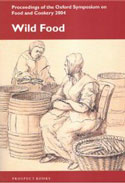
EU English Edition
|
|
“The Oxford Symposium on Food and Cookery continues to be the premier English conference on this topic, gathering academics, professional writers and amateurs from Britain, the USA, Australia and many other countries to discuss contributions on a single agreed topic. Prospect Books has published these proceedings since 1981 with a short break in 2001-2003.
Forty papers cover subjects as various as ginseng; wild olives; seaweed; angelica; imitation game in nineteenth century Germany; wild mushrooms; the pike; eating insects and the Mexican maize fungus, cuit lacoche.”
|
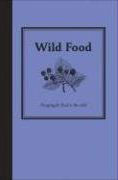
EU English Edition
|
|
“Discover the wonders of wild food, from berries to mushrooms to fresh herbs – all of which are wonderful foods free on our doorstep. The author Jane Eastoe shows you how to find, identify and cook a range of wild food, including nuts, seeds, roots, fruit, flowers, seaweed, fungi and plant leaves. Elderberry flowers can be used for making cordial, nettles make delicious soup and sloe gin and dandelion and burdock are just two great traditional recipes that can be made from the hedgerow larder.There are dangers in some wild plants and the author gives guidance on how to pick safely (for example cooking elderberries destroys the toxins present but the leaves, bark or roots of the elder should never be eaten). Mushrooms are notoriously difficult to get right so Jane Eastoe gives you the key dos and don’ts on mushroom picking.What to take on a culinary walk in the countryside? What foods are available in what season? What’s the nutritional value of certain wild foods?”
|
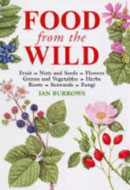
EU English Edition
|
|
“The fields, woods, hedgerows, coasts, gardens and even wastelands of Britain and northern Europe are home to an abundant supply of edible plants that are good to eat raw, cooked as a meal in themselves or used as a culinary ingredient in a variety of dishes. Food from the Wild is a practical field guide to over 250 species of fruits, nuts and seeds, flowers, plant leaves, herbs, roots, seaweeds and fungi found in Britain and northern Europe. Each entry gives detailed information on size, appearance, occurrence, habitat and instructions on preparation cooking, One or more accurately drawn yet stunning artworks accompany the text to aid identification when out in the field. An introduction covers the methods used to preserve and store each edible foodstuff. The fungi section carries its own introduction, which gives more indepth detail on how to identify, cook and store this species, with a section on confusion species. Food from the Wild provides everything you need to know to collect and gather edible produce available in the wild in one stunning volume.”
|
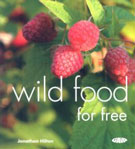
EU English Edition
|
|
“Are you fully aware of nature’s bounty? There’s free food everywhere! Herbs, salad leaves, vegetables, berries, nuts and fungi can all be found. From edible seaweed and fennel to horseradish and wild asparagus, from the roadside to seaside every environment holds a burgeoning larder. “Wild Food” shows you what plants and fungi are edible, where to look for them, how to safely identify them and how to prepare them. There’s even a section devoted to delicious recipes so that you have everything you need to make the transition from pathway to plate. Organised by environment and with clear instructions for identification, this is the European forager’s bible.”
|
|
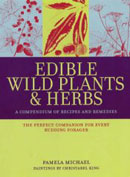
EU English Edition
|
|
“Exquisitely illustrated with full-colour paintings of all the plants and herbs in the book, ranging from dandelion and sorrel to sea beet and samphire, Edible Wild Plants and Herbs is both a cookbook and field guide to the identification and use of foodstuffs from the wild. There are almost 400 recipes covering nearly 100 different plant varieties and the illustrations, drawn from life by one of the country s leading botanical artists, show the edible parts of the plants at their peak time for picking. In addition there is a calendar indicating what plants to look for at each season of the year, information on where the plants are found and how to identify them. In the past the home kitchen provided a family with all its medicines and cosmetics as well as its food, wine, pickles and preserves. Our ancestors were resourceful and imaginative and very much in tune with nature; this book recaptures their harmonious, sustainable way of life by setting down for the modern reader all that knowledge and lore.”
|
|
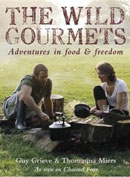
EU English Edition
|
|
“Bringing out the best of the real British countryside, this book penned by the hugely talented, fun and inspirational Thomasina Miers and her hunter partner, Guy Grieve, is fantastically produced. The paper, the design, the photography all contribute to make this book a must-have in your kitchen or your bookshelf. Full of the most delicious sounding recipes that Tommi has concocted from her time in the wild, you’ll never go for a country walk and feel the same way again. It’s earthy, natural and makes you want to explore England now.”
|
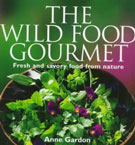
EU English Edition
|
|
“Collects one hundred recipes featuring fresh-picked greens, berries, and mushrooms, including maritime fiddleheads, curried cattail soup, salmon and sheep sorrel mousse, blini with trumpet chanterelles, and hazelnut-berry tartlets. Consider this visual treat a must-own for serious hobbyists and would-be authors. Anne Gardon’s superlative photography of edible wild plants and the gourmet dishes and drinks she has created, along with her excellent text, and a eye-pleasing design by Gillian Tsintziras, make this Firefly book a delight to behold. Filled with attractive photos of everything — wild herbs as well as the dishes made from them.”
|
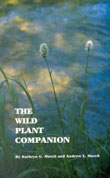
EU English Edition
|
|
“Sections on wild plants for survival, medicine, and cooking, with illustrated discussions of several dozen plants, using European, Chinese and American sources. Designed to be company for persons already acquainted with wild plants, who take pleasure in finding their own thoughts in other’s words and desire to pursue a different kind of advanced botany. Includes discussion of the placebo effect.
What I like best about this book is its prose style–it conveys the intended information in a pleasant, almost conversational way. One feels the authors are people who have really eaten and used these plants and are practically standing there telling you about them. There are the little insights that come from experience which one rarely finds in more formalized presentations.”
|
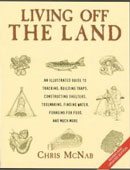
EU English Edition
|
|
“Trained soldiers will tell you that the art of survival relies heavily on two essential skills: finding food and finding water. In any survival situation, it is vital that you adapt to your surroundings as quickly as possible and make good use of the sustenance nature has to offer. Revised edition contains everything the survivor needs to know about thriving in nature, from making tools and finding water to eating plants and catching fish. With a new chapter on surviving urban disasters, which includes information on emergency water supplies, self-defense, and cooking without power, and over 100 illustrations, this book is packed with practical information. Insightful tips include how to make fire without matches and how to master the art of making traps and snares to catch food.”
|

EU English Edition
|
|
“Originally published in 1936, this is an excellent manual on British animal tracks and tracking. The book is full of clear diagrams and natural history information and is still of much practical use today. Many of the earliest books, particularly those dating back to the 1900s and before, are now extremely scarce and increasingly expensive. Hesperides Press are republishing these classic works in affordable, high quality, modern editions, using the original text and artwork. Contents Include -GENERAL: Definition of Tracking – The Normal Footprint – Classification by the Normal Footprint – Gait, and the Normal Trail – Classification by the Normal Trail – The Significance of Variations from Normal – The Discovery of Tracks – Telling the Age of Tracks – Following a Track.”
|
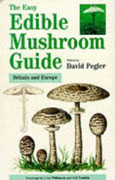
EU English Edition
|
|
“Wild mushrooms can be difficult to identify, and many poisonous species look similar to edible ones. An identification guide must therefore leave nothing to doubt, and this book uses both photographs and drawings to present all the essential details.’ This book is written and illustrated by experts. It has colour drawings, photographs, excellent descriptions and at 21cmx13cm is a good size to use as a field guide. As well as the edible fungi it has a section on the poisonous ones and some recepies to try after a hard day collecting. The only thing it doesn’t tell you is where the edible fungi are. But that’s a secret we all keep!!! An excellent and very useful guide. I haven’t died yet!”
|
|
|
A Selection of DVDs from our:
Survival Skills Bookstore
“Ray Mears – Wild Food”
(2007)
by
BBC/Woodlore Ltd
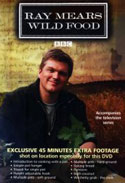
Region 2 DVD playable anywhere with a multi-region DVD player and compatible TV
“Ray Mears – Bushcraft
Series 1″
(2005)
by
BBC/Woodlore Ltd
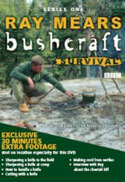
All Regions DVD playable anywhere on any DVD player and compatible TV
“Ray Mears – Bushcraft
Survival”
(2005)
by
BBC/Woodlore Ltd
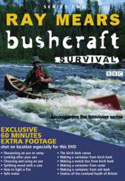
All Regions DVD playable anywhere on any DVD player and compatible TV
“Ray Mears
Extreme Survival
Series 1 & 2″
(2003)
by
Day Gardner Productions Ltd
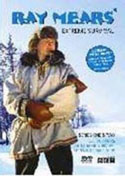
Region 2 DVD playable anywhere with a multi-region DVD player and compatible TV
“Ray Mears
Extreme Survival
Series 3″
(2003)
by
Day Gardner Productions Ltd
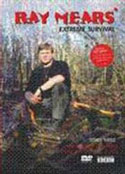
Region 2 DVD playable anywhere with a multi-region DVD player and compatible TV
“A Hedgerow Cookbook”
by
Glennie Kindred
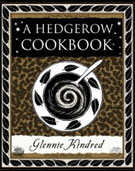
EU English Edition
|
more books about ‘foraging’, ‘wild food’ and ‘living-off-the-land’ on pages:
1 |
3
Ancient Survival Skills |
Practical Self Sufficiency
like to buy online? – get great extra rewards with an
Amazon.com Platinum Visa Card …
please take a look at the advice for
First-Time Visitors to Amazon.com
and reassure yourself with the
Safe Shopping Guarantee

please take a look at our Ancient Mysteries Bookshoppe for a wide selection of books
that challenge orthodox views of prehistory on every continent
Home |
Research Projects |
Skywatching |
News & New Discoveries |
MarketSpace
Marine Archæology News Archive |
Astro-Archæology News Archive
all material on this page
Copyright © 1996-2009 The Morien Institute
|